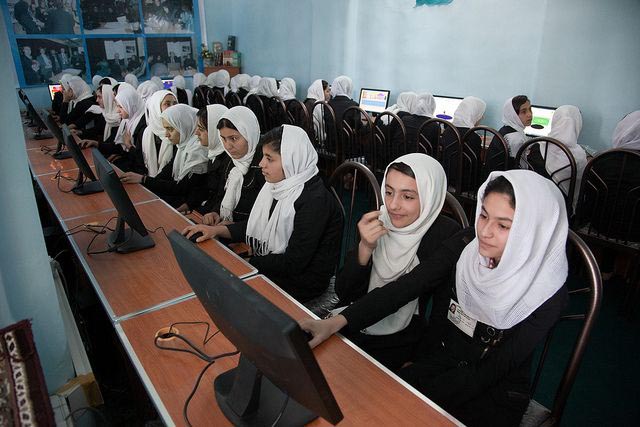We admit the role of quality education central to development of every country we aspire to associate with, anyway. It is believed education is one of the elements; entailing dynamic programs of socio-political and economic riches –it can only transform us from underdeveloped state into fully developed state. We have been narrating tales of technological progress, economic gains and educational developments the rest of the world has achieved, bidding to create an inspiration to our fate makers’ so that they could steer the country on the agreeable course of sustainable success.
It is anticipated the government and concerned departments launches the state of emergency meant not only to increase the students’ enrollment but also assures the provision of complimentary modern education. The allocation of most of resources into this sector is the cognition of aforementioned reality. Being driven by motives of change, the government diverts every saved penny for educational excellence is day dreaming. The level of consideration levied to educational uplift depicts the stance of government which is characterized by negation, underestimation, exclusion and refutation.
Earlier a study was conducted by Afghanistan Research and Evaluation Unit (AREU) that underlined widespread radicalization, including an extensive presence of radical activists among high school students in Afghanistan. It is a point of grave concern for masses, government and international community alike. The last three decades Afghanistan’s education system was steered with ample radicalization. Control of the education system has been a mobilizing force for the conservative and radicalized movement that led to overthrow of the Soviet government and the subsequent rise to power of the Taliban. During the reign of the Taliban the educational system was inclined to produce Mujahedeen. Till date Taliban diverged several illogical reasons for justifying killings of thousands of innocents, prohibiting women from acquiring education, labeling co-education illicit and the modern scientific inventions desecrated, the list goes on and on. There is hardly any sort of condemnation noticed.
The study reiterates that the on-going radicalization of high-school students has not yet reached a critical point, where it could contribute decisively to the destabilization of the country. However, rather than waiting for that to happen, the competent authorities should reconsider the effectiveness of their educational policies and, first and foremost, their ban on political activities in high schools. The study notes that if the ban were to be revoked, at least there would be a more level playing field in high schools, allowing a greater variety of parties and organizations to compete for the loyalty of the younger generation. To date, the ban has primarily only been successful in keeping out moderate and progressive groups.
It is evident such education can function as a root cause and feeder of conflict, with the potential to retrench ethnic/religious divides and other societal cleavages. This dual nature of education reflects both the positive, or peace building and the negative, or conflict enhancing potential of education. A careful examination of the linkage between education conflict and peace building in Afghanistan demonstrates the ways in which education policy reforms have to deliberately be used creating the conditions for building a foundation for reconciliation and sustainable peace or endless conflict.
It is mentioned that political parties with radical outlook whose centers are outside the country, recruit teachers here with high salaries and then attract the attention of students. It is cautioned such groups want to infiltrate all tribes and ethnic groups of Afghanistan. Some parties are mostly active in Kunduz and their goal is to infiltrate all tribes in Afghanistan, the study recorded. It is heart wrenching to find education department showing negligence or criminal complicity to bare those behind such clandestine movement. It is indeed a great challenge for this department already meagerly administered and poorly governed –the cry for lack of resources is high, however when substantiated is defrauded. Afghan education sector already suffering of poor management, was struck by sever stroke of fund misappropriation and now it funds insurgents and turns into breeding ground of extremism may not serve the interest of nation at all.
Earlier school teachers being recruited and appointed by the Taliban in the Shah Joy district was reported. This worrying stance is affirmed by the serving head of the province confirming salaries of teachers were being pocketed by the Taliban as a number of insurgents have been appointed as instructors in the schools. It is unbelievably frightening the monetary allocation for education is funding heinous crimes –education is shunned in ignorance and militancy is supported instead. Regretfully, incriminating education which undoes the fear out of the mind and heart of people is camouflaged in the constant cloud of terror and endless fear –unluckily parasitizes on its very existence. It is right for the world and us to worry about the declining impact of Afghanistan’s dysfunctional educational system, especially when it has been demonstrated that poorly educated young men in a country as large as Afghanistan pose a serious security threat to the rest of the world. Millions of families, especially those with little money, send their children to religious schools or Madrasas. Many of these schools are the only opportunity available for an education, but some have been used as nurturing ground for violent extremism. There is no doubt that Madrasas need to be reformed.
Afghanistan’s education system requires an almost total overhaul. In the modern world, economic growth and the spread of democracy have raised the value of education and increased the importance of ensuring that all children and adults have access to high quality and effective education. Education promoting the rich human values is increasingly driven by a growing understanding of what works in education and how to go about successfully improving teaching and learning in schools with sufficient resource allocation. Pluralistic education plays an essential role in relation to conflict prevention, resolution, reconciliation and reconstruction. Under these rationales, education should be structured as a non-traditional tool for building security by linking education to the human security framework.

